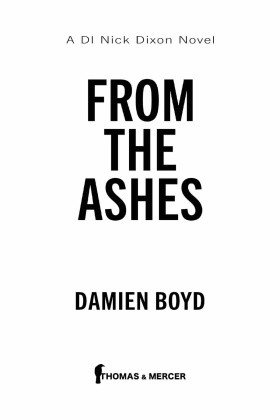She followed him into the utility room, the internal door to the garage standing open. Then he opened the car door and slid into the passenger seat. He opened the glovebox with his left hand, reached in with his right hand inside an evidence bag and took out the baby’s dummy, turning the bag inside out as he did so.
It was a well-practised routine, as any dog owner could testify.
‘We need to get this off for DNA testing,’ he said, sealing the bag and handing it to Louise.
Chapter Twenty-Four
Dixon had been at Express Park for over an hour when he spotted Charlesworth’s car turning into the visitors’ car park at the front of the building. The floor to ceiling windows had their uses.
‘What does he want now?’ asked Jane.
‘I’m guessing he’s had a call from his opposite number at Devon and Cornwall and wants me to tread carefully.’
‘I’ve never known you do that.’
‘Neither’s he, but he’s got to go through the motions, I suppose.’
Jane grinned. ‘You stomp.’
‘Thank you, Sergeant.’
‘You’re welcome.’
‘How’s Rod doing?’
‘Better, I think,’ replied Jane. ‘I’ll be off to see him in a bit. He’s coming home tomorrow.’
‘Did you speak to Jonathan?’
‘He can’t do us in Brent Knoll on Valentine’s Day. It’s a Saturday and it’s been booked up for yonks, so we could do either Friday the thirteenth in Brent Knoll or Valentine’s Day at Berrow church. That’s free, apparently, and he can get us a special dispensation or something.’
‘Berrow it is, then.’ His phone was buzzing in his pocket. ‘The crafty sod’s sent me a text message.’ It was a new tactic that made dodging an ambush impossible. ‘“Deborah and I are in meeting room two. Thank you,”’ he said, reading aloud.
‘He doesn’t actually ask you to go.’ Jane was trying to be helpful. ‘It’s just a statement of fact, isn’t it?’
A fair point, but the alternative wasn’t exactly inviting, and he’d been putting it off for an hour already. A phrase involving the devil and the deep blue sea sprang to mind; it was either a meeting with Charlesworth and his entourage or the father of the baby boy. Campbell had said his meeting with him had been the most difficult of his career, and Dixon’s was unlikely to be any easier.
Perhaps a cosy chat with Charlesworth might not be so bad after all?
Louise intercepted him as he weaved his way through the workstations towards the stairs. ‘These are the witness statements the Torquay lot took from the Somerset bridge team at the time,’ she said.
‘Do they mention the boy?’
‘There’s a paragraph in each where they say they didn’t see a child at all, at any point during the fire, so they must’ve been asked the question.’
‘And lied.’
‘Unless it was a different bridge team.’ Louise gave a nervous shrug. ‘It could’ve been, which would mean all this has nothing to do with . . .’ Her voice ran out of steam; taken the point as far she dared, possibly.
The thought had occurred to Dixon, but if right, that would make it the mother of all coincidences.
Charlesworth was standing on the landing outside meeting room 2, his eyes fixed on the top of the stairs, waiting for Dixon to appear. He gave a smug grin, pleased with himself that his new tactic had worked.
Blocking his number was the obvious answer.
‘Come in, Nick,’ said Charlesworth, his arm extended much like an usher’s at a wedding. ‘I’ve got Andrew Yeend here, the Devon ACC.’
An ambush good and proper then.
‘We’d like an update on the investigation, if you’ve got a minute,’ continued Charlesworth. ‘And I know that Andy has some concerns.’
Deborah Potter was looking concerned too, and Vicky Thomas, the press officer, but then she always did. It would’ve been standing room only, if Charlesworth hadn’t got an extra chair from somewhere.
‘The boy is dead,’ said Yeend, a strident edge to his voice. Oddly loud.
Dixon wasn’t sure who he was trying to convince. ‘Whether he is alive or dead, it remains a possible motive for these murders and will be explored on that basis.’
‘We had a lot of trouble with the father,’ continued Yeend. ‘And you’re opening a real can of worms for us here. There was litigation over the decision to close down the investigation. He applied for judicial review of the inquest verdict, employed a private detective, and there was lots of bad publicity for us. It dragged on for years.’
‘Frankly, I don’t blame him. The man had lost his wife and son.’
‘In a fire. And I would remind you that the pathologist’s report—’
‘I’ve read it.’
‘No trace of the boy’s body was ever found, and we were being told that was entirely to be expected in a fire of that intensity. The arson investigator said so, and the pathologist.’
‘And they’re both quite right, of course,’ said Dixon. ‘There is another explanation for that, though.’

























